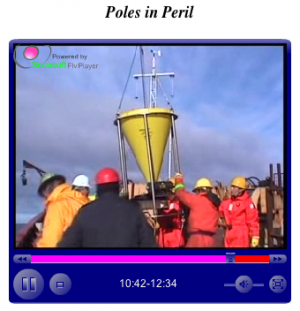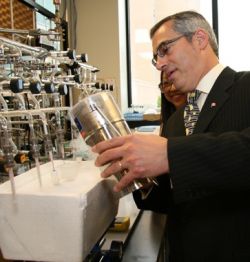A new report from Climate Action Network Canada reaches some troubling conclusions about the federal government's approach to climate science research in Canada.
On Monday, Canwest reporter Mike de Souza and La Presse journalist François Cardinal reported that leaked Environment Canada documents obtained in CAN's research show the federal department's new media relations policy, adoped in 2007, reduced the news media's coverage of Environment Canada climate scientists by 80%, leaving some of Canada's top climate experts "extremely frustrated" and feeling "muzzled".
But that's just part of the story.
The report also examines fluctuations in federal funding for climate science research in Canada. Since it was created a decade ago, the Canadian Foundation for Climate and Atmospheric Sciences (CFCAS) has become Canada's most important funding body for climate science, supporting more than 150 projects, two major programs, 24 research networks and the coordination of international activities. But its funding has virtually all been allocated, and repeated appeals to the government for more funding have not been rewarded. That means federal funding for university-based climate science research (excluding infrastructure) will likely fall, as of April 1, to less than half the level it has been at for several years. By contrast, funding for laboratory equipment and infrastructure has gone up in the past year, leaving some scientists in the remarkable position of having to close down well-stocked research centres because they can't afford to run them.
 Considering that the world's top scientific bodies have called for decisive action to prevent dangerous climate change, the federal government's refusal to adequately fund climate science research raises serious concerns. It also promises to amplify, rather than address, key remaining gaps in our understanding of climate change, specifically related to basic climate monitoring, projected impacts at the regional level, and critical climate processes such as "tipping points."
Considering that the world's top scientific bodies have called for decisive action to prevent dangerous climate change, the federal government's refusal to adequately fund climate science research raises serious concerns. It also promises to amplify, rather than address, key remaining gaps in our understanding of climate change, specifically related to basic climate monitoring, projected impacts at the regional level, and critical climate processes such as "tipping points."
A 2009 statement from the Canadian Meteorological and Oceanographic Society indicates that: "Canada's climate monitoring north of the 56th parallel is sparse and does not meet the minimal guidelines set by the World Meteorological Organization. In addition, research and modeling activities, particularly in the academic sector, are at risk of being compromised severely by a lack of funding."
 That state of affairs seems to conflict with the priorities expressed in the mandate of the federal Science, Technology and Innovation Council, which was created to provide "evidence-based science and technology advice on issues... which are critical to Canada's economic development and social well-being" and also to "produce regular national reports benchmarking Canada's science and technology performance against international standards of excellence."
That state of affairs seems to conflict with the priorities expressed in the mandate of the federal Science, Technology and Innovation Council, which was created to provide "evidence-based science and technology advice on issues... which are critical to Canada's economic development and social well-being" and also to "produce regular national reports benchmarking Canada's science and technology performance against international standards of excellence."
The 18-member council replaced the National Science Advisor, whose role was to provide "sound, unbiased and non-partisan advice." However, just four of its members are full-time, working scientists — more than half are industry, business and government representatives, which reduces the probability that the council will make a priority of defending fundamental scientific research.
The report's author, Andrew Cuddy, states that his research makes it "difficult not to arrive at the conclusion that the government of Prime Minister Stephen Harper sees climate change only as a political problem, not a real-world threat." Yet in a speech in 2007, Prime Minister Harper described climate change as "perhaps the biggest threat to confront the future of humanity today."
A government that takes those words seriously would adopt the recommendations in this report. It calls for the government to:
- Maintain the quality of university-based climate science research in Canada by restoring funding to the Canadian Foundation for Climate and Atmospheric Sciences;
- Adopt legislation to co-ordinate and integrate climate science research across federal departments and agencies;
- Increase transparency and accountability for departmental spending on climate science research;
- Establish a permanent commission of independent experts with a mandate to periodically review and publicly report on the science, impacts and economics of climate change and solutions;
- Revise the Environment Canada media relations policy to give journalists timely and adequate access to its scientists and experts;
- Deliver on its 2006 election promise to establish a commission that would "set merit-based requirements for appointments to government boards, commissions, and agencies" — including science funding bodies.
As much as the report raises troubling questions, it also proposes some strong and workable solutions — ones that would make Canada stronger, better informed and more prepared to face one of the greatest challenges of our time.
Matthew Bramley was with the Pembina Institute from 2000 to 2011, serving as director of the climate change program and director of research.



